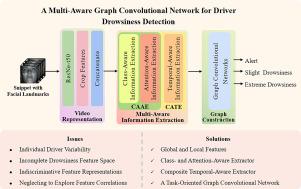用于检测驾驶员瞌睡的多感知图卷积网络
IF 7.2
1区 计算机科学
Q1 COMPUTER SCIENCE, ARTIFICIAL INTELLIGENCE
引用次数: 0
摘要
驾驶员瞌睡是交通事故的主要原因。利用深度神经网络,基于面部特征的方法在嗜睡检测方面取得了可喜的成果。然而,这些方法存在两个局限性。首先,它们只关注一个或两个面部区域的特征,从而忽略了不同面部区域特征之间的关系。其次,这些方法难以考虑驾驶员的个体差异,而驾驶员可能会表现出不同的嗜睡迹象,这是一种常见现象。这些局限性导致嗜睡检测不准确。为了解决这些问题,我们在本文中提出了一种多感知图卷积网络(MAGCN)。MAGCN 的核心是两个特征提取器:类别和注意力感知提取器(CAAE)和复合时间感知提取器(CTAE)。CAAE 探索全局和局部面部特征之间的相互依存关系,而 CTAE 则利用时间信息来捕捉特征的动态变化。此外,还设计了面向任务的图卷积网络,以完善嗜睡特征空间,从而实现精确检测。实验结果表明,在两个公共数据集上,与最先进的嗜睡检测方法相比,所提出的 MAGCN 具有极具竞争力的检测性能。总之,所提出的模型不仅能学习和分析不同面部区域特征之间的相关性,还能解决驾驶员个体差异问题。本文章由计算机程序翻译,如有差异,请以英文原文为准。

A multi-aware graph convolutional network for driver drowsiness detection
Driver drowsiness is a leading cause of traffic accidents. Utilizing deep neural networks, facial feature-based methods have achieved promising results in drowsiness detection. However, these methods suffer from two limitations. Firstly, they only focus on features from one or two facial regions, thus overlooking the relationships between features across different facial regions. Secondly, these methods struggle to account for individual driver variability, a common phenomenon where drivers may display dissimilar signs of drowsiness. These limitations lead to inaccurate drowsiness detection. To address these issues, in this paper we propose a multi-aware graph convolutional network (MAGCN). At the heart of MAGCN are two feature extractors: the class- and attention-aware extractor (CAAE), and the composite temporal-aware extractor (CTAE). The CAAE explores interdependencies within global and local facial features, while the CTAE leverages temporal information to capture dynamic changes in features. Moreover, a task-oriented graph convolutional network is designed to refine the drowsiness feature space for precise detection. Experiment results show that the proposed MAGCN exhibits competitive detection performance, when compared with state-of-the-art drowsiness detection approaches on two public datasets. In summary, the proposed model not only learns and analyzes correlations between features from various facial regions, but also tackles individual driver variability.
求助全文
通过发布文献求助,成功后即可免费获取论文全文。
去求助
来源期刊

Knowledge-Based Systems
工程技术-计算机:人工智能
CiteScore
14.80
自引率
12.50%
发文量
1245
审稿时长
7.8 months
期刊介绍:
Knowledge-Based Systems, an international and interdisciplinary journal in artificial intelligence, publishes original, innovative, and creative research results in the field. It focuses on knowledge-based and other artificial intelligence techniques-based systems. The journal aims to support human prediction and decision-making through data science and computation techniques, provide a balanced coverage of theory and practical study, and encourage the development and implementation of knowledge-based intelligence models, methods, systems, and software tools. Applications in business, government, education, engineering, and healthcare are emphasized.
 求助内容:
求助内容: 应助结果提醒方式:
应助结果提醒方式:


